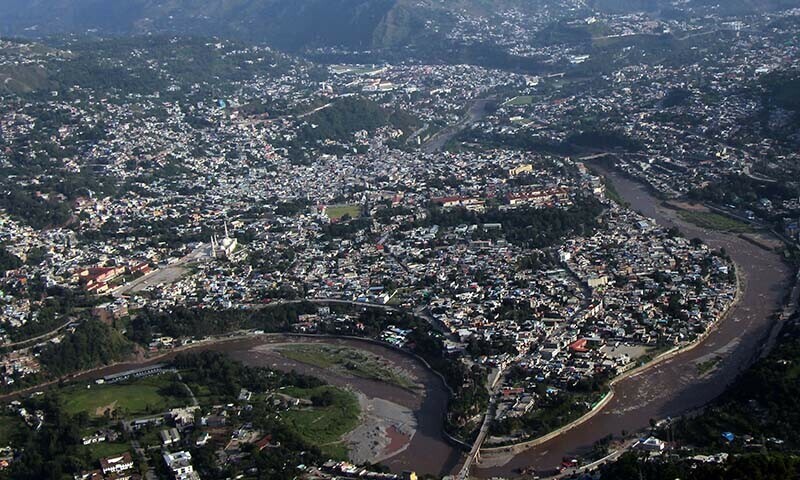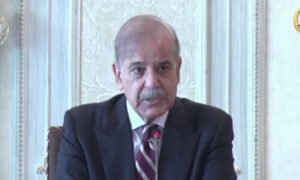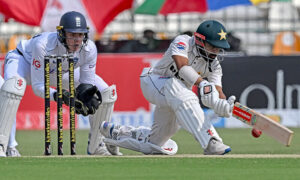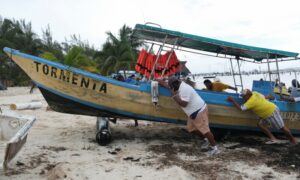Amid promises of reconstruction that came to naught, survivors of the 2005 earthquake struggle with their personal traumas.
In October, the northern districts of Azad Jammu and Kashmir and neighbouring areas of Khyber Pakhtunkhwa — struck by one of the worst natural disasters nearly two decades ago — are once again filled with an air of despondency as survivors relive their bitter memories.
Though life on the surface appears to have returned to normal, the psychological scars left by the disaster remain deeply ingrained in the hearts of many. Survivors continue to struggle with the emotional toll of their losses, trying to overcome memories that still haunt them.
Muhammad Shafique Mir, now nearly 70, is a member of Muzaffarabad’s community of traditional bakers who have been making famous Kashmiri goodies — Kulcha and Shirmaal — in firewood ovens for generations.
On the morning of October 8 2005, Shafique was at his shop when the earthquake struck at 8:52am, catching everyone off guard. No one had ever imagined such a catastrophic tremor could hit the region.
Despite the alley being no more than five feet wide, only two lives were lost in that narrow lane. However, Shafique had no idea of the horror awaiting him just 600 yards away, at home.
“Through the collapsed structures and the cries of pain, I somehow made my way to our house,” Shafique recalls, his voice dripping with emotion. When he arrived, he was met by a mountain of rubble where his three-storey home once stood, burying everyone inside.
Nine family members were pulled out alive, but five others — his daughter, three paternal cousins and their mother — remained trapped beneath the debris. Five bodies were recovered within the next ten days, with the final remains being found 23 days later.
Heartbreakingly, two more cousins and an infant niece were killed at different locations. One cousin, a university lecturer, died while on his way to work. His infant daughter, carried by a maid to her grandmother’s nearby house, went missing.
Both bodies were recovered six months later when official agencies cleared the streets of rubble. Another cousin perished in his shop at Upper Adda, along with a customer. In a nearby alley, eight more family members lost their lives in the home of a distant cousin.
“October brings it all back,” Shafique says quietly. “The pain we endure is impossible to put into words.”
Shafique’s story is not an isolated one. Almost every household in Muzaffarabad, hit hard by their proximity to the epicentre, has a story of loss and survival.
Living with trauma
Shafaq Nadeem, now 51 and an officer in the AJK Health Department, says that day changed his life, forever.
The earthquake took his parents and brother when their family home collapsed in the Plate neighbourhood. A paternal uncle and cousin died separately in their own home in Madina Market.
“The quake didn’t just destroy our homes; it shattered our dreams, our hopes, and our futures. Even after all these years, the scars remain, and the memories of that day still haunt me.”
The enduring emotional impact of the earthquake has been felt across generations.
Dr Khawaja Hamid Rashid, a leading psychiatrist in Muzaffarabad, has counselled thousands of survivors suffering from post-traumatic stress disorder (PTSD).
“With time, many survivors have moved past the acute symptoms, but around one-third remain deeply affected by trauma,” Dr Rashid explains. “The difference now is that they keep it to themselves.”
Some survivors have isolated themselves, while others have left the towns and neighbourhoods where they lost loved ones. “I know people who left Muzaffarabad after losing children in the quake and have refused to return, despite still owning property here,” he says.
Interestingly, Dr Rashid has observed another phenomenon in recent years.
“While many parents who lost children sought counselling, I’m now seeing more grown-up children seeking help. These young people, on the verge of entering college or beginning their professional lives, struggle with the absence of parents they lost to the quake.
“It would be wrong to say the psychological impact of the earthquake has ended. PTSD and other emotional issues continue to linger, manifesting in different ways,” he adds.
Promises made and broken
Aid had poured in from across the globe to help Pakistan rebuild the shattered cities, towns, and villages as the devastating disaster had claimed over 46,000 lives and injured another 33,100 in AJK alone, in addition to destroying or damaging 314,474 homes and reducing nearly all essential facilities and infrastructure to rubble.
The federal government established the Earthquake Reconstruction and Rehabilitation Authority (Erra) to spearhead rebuilding efforts.
In AJK and KP, the State Earthquake Reconstruction and Rehabilitation Authority (Serra) and Provincial Earthquake Reconstruction and Rehabilitation Authority (Perra) were created to ensure the smooth execution of reconstruction-related projects.
In the initial years, Erra’s primary focus was providing compensation, housing grants and livelihood recovery. Later, it shifted to reconstruction-related work, during which the Erra Board approved the reconstruction of 7,608 projects in AJK from time to time.
These projects were divided into three funding modes: sponsor-funded (1,632 projects), donor-funded (777 projects) and funded by the federal government (5,199 projects).
Simultaneously, a separate urban development programme was also conceived, to be executed directly under Erra’s administrative control.
The Muzaffarabad City Development Project (MCDP) had a proposed allocation of $361 million — $300m through Chinese preferential buyer’s credit and the rest from federal government funding.
The volume of the Bagh City Development Project (BCDP) was Rs7.35 billion, to be arranged from the government funding, and that of the Rawalakot City Development Project (RCDP) was Rs8.20bn, including a Saudi loan of $70m.
All three urban development programmes were approved by the Executive Committee of the National Economic Council (Ecnec) in 2007.
However, implementation of the MCDP was delayed due to disagreements over overhead costs with Chinese construction firms, forcing Erra at one point in time to consider reconstruction of the ravaged AJK capital from internal resources, though at a reduced scale.
Over time, the Chinese companies lowered their overhead charges, allowing reconstruction to proceed. Unfortunately, resources were stretched thin, and resultantly, $353.27m, including the $300m loan, were apportioned among three cities — Muzaffarabad ($191.18m), Bagh ($123.48m) and Rawalakot ($38.72m).
Unlike Serra, where the AJK government had appointed an efficient team of officials from various departments to oversee reconstruction across all three modes of execution, the selection of staff for the project management units (PMUs) of urban development programmes remained solely under Erra’s control, effectively side-lining the AJK government from the process.
“Erra was supposed to approve and monitor projects, not execute them directly,” said a retired AJK government official who held a key position in the post-earthquake period, explaining that Erra’s 2007 ordinance assigned responsibility for project execution to the local governments of AJK and KP.
Nevertheless, Erra handpicked officers for the city development projects, which led many people to blame the alleged “oversight and collusion” between the client, contractors and consultants for both the selection of projects and the overall quality of work, particularly in Muzaffarabad and Bagh.
Projects such as two mega shopping complexes in Muzaffarabad were built without fully considering the city’s needs and remained underused for years.
More troublingly, substantial sums were spent on constructing palatial residences for AJK’s president and prime minister — buildings far bigger than the actual needs of both offices.
The prime ministers never moved to their newly built accommodation. After years of disuse, the sitting AJK premier recently allotted it to Tevta, an official institution imparting technical education and vocational training.
People in Muzaffarabad still sarcastically refer to a non-operational water supply network of black plastic pipes and mostly choked sewerage lines whenever they question the transparency in expending MCDP funds.
Similar complaints have come from Bagh, the second hardest hit town, where people say funds were wasted on constructing flawed sewerage lines and water distribution network.
Faisal Jameel Kashmiri, a renowned civil society activist from Muzaffarabad, blames the AJK government departments for acting as “silent spectators” over visible mismanagement and poor quality of work or, in some cases, non-utility of projects built under the urban development programmes.
“Whatever the reason, they failed to take ownership of urban development schemes or else the wastage of the borrowed money could have been prevented.
“Perhaps they followed the adage: Don’t interrupt your enemy when he is making mistakes,” he adds wryly.
Meanwhile, although all 2,409 projects funded by sponsors and donors were completed on time, as many as 1,730 of the projects financed by Islamabad remain in limbo, stalled due to a lack of funds since 2021, according to Serra officials. These projects include 1,112 schools and 41 health facilities.
To complete the 919 projects already underway, Rs20.11bn is needed. The remaining 811 yet-to-be-started projects will require Rs24.01bn. The Erra Act of 2011, passed to provide legislative cover for reconstruction efforts, mandates the completion of these projects.
However, despite a decision taken at the 14th Erra Council meeting in 2021 to allocate one-time funds, Islamabad has yet to release the required resources. Repeated requests from AJK officials, including the state premier, have yet to gain any headway.
Transformation and ongoing concerns
In 2018, the National Disaster Management Commission (NDMC) proposed merging Erra into the National Disaster Management Authority (NDMA) to streamline disaster management efforts. However, this merger has yet to be finalised, requiring the consent of the provincial assemblies of Punjab and Sindh and legislation from parliament to revoke the Erra Act of 2011.
Although Erra and NDMA continue to operate as separate entities, NDMA’s chairman has also been assigned the role of Erra’s deputy chairman/chairman.
While NDMA has absorbed Erra’s budget, assets, and responsibilities, it has not retained the experienced human resources from the reconstruction-related bodies — professionals with over 18 years of expertise in disaster management.
As Erra’s operational responsibilities have effectively shifted to NDMA, concerns persist about the fate of the incomplete projects.
On May 17, the AJK Legislative Assembly passed a unanimous resolution, urging the federal government to ensure the completion of Erra’s remaining projects through NDMA while maintaining legislative cover for post-earthquake reconstruction in AJK.
Forgotten future
As these bureaucratic shifts unfold, the most vulnerable continue to suffer: nearly 200,000 children in AJK’s quake-affected areas remain deprived of proper schooling and forced to study outdoors in harsh weather because educational infrastructure projects remain incomplete.
Every October, the non-completion of schools becomes a focal issue, but only for a few days, before it is forgotten again, left at the mercy of fate.
Irshada Bibi, a teacher at a girls’ primary school in Jiskool village in Jhelum Valley District, laments her students’ dire conditions. “It’s difficult to teach students, particularly in winter. When it rains, we have to send them home. We are in dire need of a building,” she says.
Similar stories emerge from other schools, where either construction was left unfinished or never began.
Ali Abbasi, a 10th-grade student at Boys High School Duchore Mira’n, a mountain village just 38 kilometres from Muzaffarabad, shares his frustration: “We’ve grown up seeing this unfinished building as our school. People in cities can’t imagine the conditions in which we try to fulfil our parents’ dreams.”
“What’s our fault? Why are we forced to study in such conditions?” he adds, echoing the sentiments of countless students who desperately await completion of their respective school buildings.
Building codes: a grey area
While the infrastructure that emerged after the earthquake, including educational institutions, health facilities, and government offices, has undeniably transformed the outlook of previously devastated cities, the reality remains mixed.
Public sector buildings have been constructed in strict compliance with building codes, ensuring they are now earthquake-resistant. However, adherence to building codes in the private sector tells a different story.
In the worst-affected areas, streets that many hoped would be widened during reconstruction have instead fallen prey to encroachments.
In Muzaffarabad’s Khawaja Mohalla, one of the hardest-hit areas where hundreds lost their lives in an instant and rescue efforts were delayed for weeks, new concrete buildings have sprung up. Yet, the narrow streets, once considered a priority for widening, remain unchanged.
“This happened because of indecision by government departments,” laments Shafique Mir, who is still living in a tin-roofed structure nearly two decades after the disaster.
“Had they bulldozed through those narrow streets after the earthquake and converted them into wide, safe roads, no one would have objected. But when they failed to act, people just rebuilt on the same old boundaries.”
In 2019, a shelter in one of Khawaja Mohalla’s narrow alleys caught fire and was reduced to ashes because fire trucks couldn’t reach the site.
“That incident should have been a wake-up call,” says Kashmiri. “The government had a master plan, prepared by a Japanese organisation, which included widening streets and relocating families from hazardous areas. But it was never implemented,” he laments.
Unplanned construction, with little regard for building codes, has since spread across Muzaffarabad, adding to the city’s vulnerability.
“The recommendations and guidelines were blatantly ignored,” says Raja Omar Ahsan, an activist with years of experience in relief and rehabilitation activities.
“While most public sector buildings follow the codes, unchecked urbanisation and construction in red zones — areas at high risk — are another disaster waiting to happen.
“Muzaffarabad sits on two fault lines, and yet we act as if that danger doesn’t exist.”
The situation in other quake-affected areas is no better. According to Tahir Hussain Gardaizi, an activist in Bagh, around 174 buildings in his city were declared dangerous by international experts after the quake.
“But instead of demolishing them, they’ve been superficially repaired and turned into residential or commercial spaces.”
Muzaffarabad’s satellite town project, initially intended to provide safe housing for survivors, has also become a symbol of corruption and mismanagement.
“The land was supposed to go to the most affected people,” says Khawaja Nauman Zaroo, a trader in Muzaffarabad’s main bazaar. “Ironically, plots were handed out to people from across the state who were hardly affected by the earthquake. The real survivors were left with no choice but to stay in the same narrow streets where they had once seen their loved ones buried alive.”
According to local residents, much of the blame lies with the Muzaffarabad Development Authority. “In 19 years, they haven’t been able to develop a single housing society,” says Raja Shakil Ahmed, a frustrated resident.
“Instead, its officers have lined their pockets, grabbing plots in the satellite towns and turning a blind eye to illegal construction in red zones and watercourses. This is corruption at its worst, and the prime minister must intervene before it’s too late.”
Across the world, calamities — whether man-made or natural — often serve as wake-up calls, teaching communities valuable lessons to help mitigate future disasters.
Unfortunately, in AJK, that lesson has been lost on many. In such cases, it falls upon institutions to enforce laws, regulations, and building codes for the greater good of society.
However, even more troubling is that in AJK, these institutions have often become complicit, allowing hazardous, unplanned construction on slopes, floodplains and other vulnerable areas, with a blatant disregard for safety standards. The result is a landscape littered with reminders of past failures and the fear of future ones.
A view of the sprawling Azad Jammu and Kashmir capital caught from its northern side. — Photo by author







